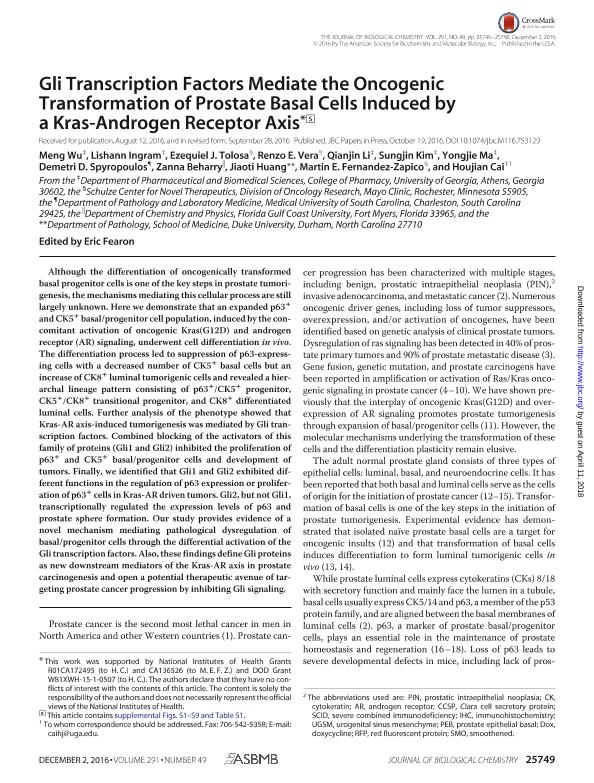Artículo
Gli transcription factors mediate the oncogenic transformation of prostate basal cells induced by a Kras-androgen receptor axis
Wu, Meng; Ingram, Lishann; Tolosa, Ezequiel Julian ; Vera, Renzo Emanuel
; Vera, Renzo Emanuel ; Li, Qianjin; Kim, Sungjin; Ma, Yongjie; Spyropoulos, Demetri D.; Beharry, Zanna; Huang, Jiaoti; Fernandez Zapico, Martin Ernesto; Cai, Houjian
; Li, Qianjin; Kim, Sungjin; Ma, Yongjie; Spyropoulos, Demetri D.; Beharry, Zanna; Huang, Jiaoti; Fernandez Zapico, Martin Ernesto; Cai, Houjian
 ; Vera, Renzo Emanuel
; Vera, Renzo Emanuel ; Li, Qianjin; Kim, Sungjin; Ma, Yongjie; Spyropoulos, Demetri D.; Beharry, Zanna; Huang, Jiaoti; Fernandez Zapico, Martin Ernesto; Cai, Houjian
; Li, Qianjin; Kim, Sungjin; Ma, Yongjie; Spyropoulos, Demetri D.; Beharry, Zanna; Huang, Jiaoti; Fernandez Zapico, Martin Ernesto; Cai, Houjian
Fecha de publicación:
12/2016
Editorial:
American Society for Biochemistry and Molecular Biology
Revista:
Journal of Biological Chemistry (online)
ISSN:
0021-9258
Idioma:
Inglés
Tipo de recurso:
Artículo publicado
Clasificación temática:
Resumen
Although the differentiation of oncogenically transformed basal progenitor cells is one of the key steps in prostate tumorigenesis, the mechanisms mediating this cellular process are still largely unknown. Here we demonstrate that an expanded p63+ and CK5+ basal/progenitor cell population, induced by the concomitant activation of oncogenic Kras(G12D) and androgen receptor (AR) signaling, underwent cell differentiation in vivo. The differentiation process led to suppression of p63-expressing cells with a decreased number of CK5+ basal cells but an increase of CK8+ luminal tumorigenic cells and revealed a hierarchal lineage pattern consisting of p63+/CK5+ progenitor, CK5+/CK8+ transitional progenitor, and CK8+ differentiated luminal cells. Further analysis of the phenotype showed that Kras-AR axis-induced tumorigenesis was mediated by Gli transcription factors. Combined blocking of the activators of this family of proteins (Gli1 and Gli2) inhibited the proliferation of p63+ and CK5+ basal/progenitor cells and development of tumors. Finally, we identified that Gli1 and Gli2 exhibited different functions in the regulation of p63 expression or proliferation of p63+ cells in Kras-AR driven tumors. Gli2, but not Gli1, transcriptionally regulated the expression levels of p63 and prostate sphere formation. Our study provides evidence of a novel mechanism mediating pathological dysregulation of basal/progenitor cells through the differential activation of the Gli transcription factors. Also, these findings define Gli proteins as new downstream mediators of the Kras-AR axis in prostate carcinogenesis and open a potential therapeutic avenue of targeting prostate cancer progression by inhibiting Gli signaling.
Archivos asociados
Licencia
Identificadores
Colecciones
Articulos(CCT - CORDOBA)
Articulos de CTRO.CIENTIFICO TECNOL.CONICET - CORDOBA
Articulos de CTRO.CIENTIFICO TECNOL.CONICET - CORDOBA
Citación
Wu, Meng; Ingram, Lishann; Tolosa, Ezequiel Julian; Vera, Renzo Emanuel; Li, Qianjin; et al.; Gli transcription factors mediate the oncogenic transformation of prostate basal cells induced by a Kras-androgen receptor axis; American Society for Biochemistry and Molecular Biology; Journal of Biological Chemistry (online); 291; 49; 12-2016; 25749-25760
Compartir
Altmétricas



